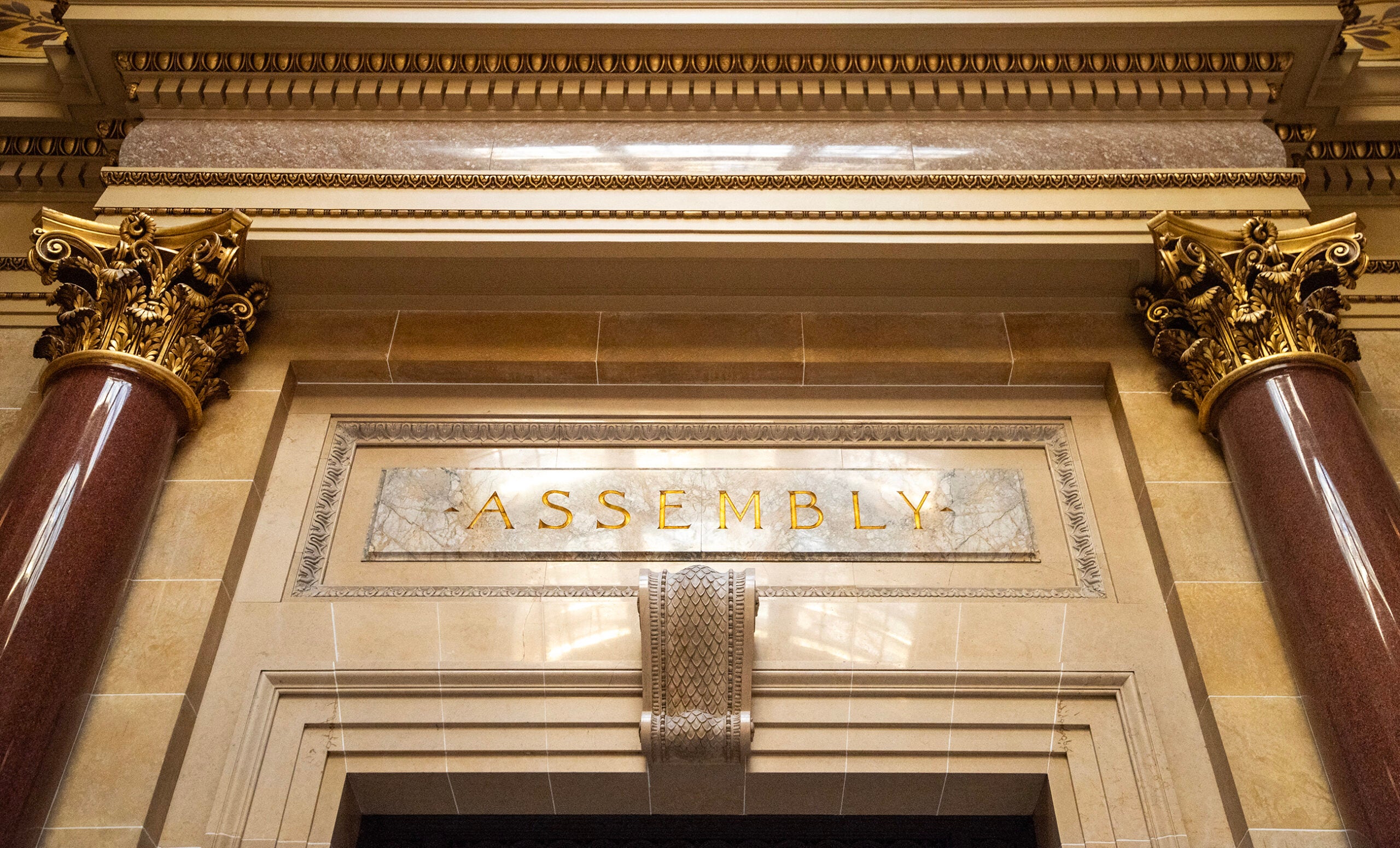The state Assembly on Wednesday approved a wide-ranging slate of legislation that would transform how reading is taught, let pharmacists prescribe hormonal birth control, and overhaul the state’s labyrinthian alcohol regulations.
The reading bill, which would move the state toward a phonics-oriented literacy instruction, received bipartisan support and a nod of approval from the state’s education department.
That proposal aligns Wisconsin with dozens of other states that are reconsidering their approach to literacy education, and comes as reading scores have dropped statewide. Only about a third of Wisconsin’s third graders were proficient in reading on the most recent Wisconsin Forward Exam, and Wisconsin’s racial achievement gap in reading is among the worst in the nation.
News with a little more humanity
WPR’s “Wisconsin Today” newsletter keeps you connected to the state you love without feeling overwhelmed. No paywall. No agenda. No corporate filter.
“It’s high time that we partner with public education to consider that the problem might not have been just funding. It might just be that we were simply doing it wrong,” said Rep. Amanda Nedweski, R-Pleasant Prairie. “We come here not to place blame or to point fingers, but to embrace the change, change course and embrace science-based literacy.”
That proposal received initial pushback over a provision to hold back third graders not reading at grade level. A revised version of the bill would put those students on improvement plans.
The bill passed on a vote of 67-27, with eight Democrats joining most Republicans voting in support.
There was also bipartisan support for the birth control bill, which would allow a pharmacist to directly give a person hormonal birth control without a doctor’s prescription. Republicans argued that this would reduce the need for abortions, while Democrats pushed for expanded birth control access and used the issue to draw attention to Wisconsin’s abortion ban and child care crisis.
“Increasing access to contraceptives is a positive step towards giving women back full control over our bodies,” said Rep. Jenna Jacobson, D-Oregon. “Thank you for giving us this breadcrumb, but also know that breadcrumbs alone will not sustain Wisconsin families or satisfy the women of Wisconsin.”
The bill passed 82-11, with only Republicans opposed.
There was near-unanimous support for substantial changes to regulations on alcohol distribution. Authors of the bill describe it as modernizing a critical, but old, Wisconsin industry. However, it has received pushback from owners of event spaces known as “wedding barns,” with some saying that a requirement to obtain liquor licenses will drive them out of business.
That bill passed 90-4.
The Assembly adjourned without taking up a controversial proposal to change how technical colleges are funded. It is not clear if that will be taken up at a later date.
Literacy bill would use ‘science of reading’ method
The bipartisan bill to overhaul how reading is taught would develop a curriculum that focuses on phonics. Supporters of the change say this is a science-based approach to literacy instruction that reflects the best research on developing brains. This approach is often referred to as a “science of reading” method.
Introduced by Rep. Joel Kitchens, R-Sturgeon Bay, the proposal would pay to retrain teachers in a new model of teaching and screen children more often about hitting literacy benchmarks. The proposal would cost $50 million, an amount Evers and GOP lawmakers agreed to in a deal reached earlier this month to fund local governments and schools.
Since being introduced earlier this month, the bill has received significant pushback from the state’s education department about a provision to hold back third graders who do not read at grade level. That provision was changed to say that students would be put onto an individualized plan to get them up to grade level, including mandatory summer instruction.
“There was that retention word that scared a lot of people in education,” Kitchens told reporters.
Some Democrats said they supported aspects of the bill but that there were too many open questions about how it would work in practice.
“It’s like talking about one piece of a puzzle without seeing the whole elephant,” said Rep. Kristina Shelton, D-Green Bay. “If we do not have these answers provided to us how can we know that this bill will be implemented with fidelity?”
Republicans said that developing literacy is foundational to every other type of learning, and to the rest of Wisconsinites’ lives.
“An illiterate society puts our democracy at risk,” said Donna Rozar, R-Marshfield. Reading, she said, is “foundational to completing high school, it’s foundational to completing post-secondary education, it’s foundational to read contracts, to read your bank statement.”
When asked for comment, a spokesperson for Gov. Tony Evers said his office is still reviewing the changes to the third-grade requirement.
In a statement, State Superintendent Jill Underly said that the bill is “a big step in the right direction.”
“Over the past few months, we have had very productive conversations with legislators as we worked together on creating a reading package that puts the needs of our kids first. Today, we have reached an agreement on how to do that,” she wrote.
The Wisconsin debate reflects a nationwide reconsideration of how to teach reading. More than 30 states have passed or are moving forward literacy instruction overhauls like the one proposed in Wisconsin, according to Education Week. Some individual school districts, including Madison public schools, have implemented this style of reading instruction.
Pharmacist birth control bill is not new, but circumstances have changed
The bipartisan contraceptives bill that passed the Assembly would allow pharmacists to prescribe hormonal birth control over the counter to adults. Patients would have to complete a self-assessment and receive a blood pressure screening.
Kitchens, who sponsored the plan, said it would be a way to prevent unplanned pregnancies by removing a hurdle to accessing contraception. He said unplanned pregnancies contribute to generational poverty and impose a cost on taxpayers.
“Parenthood is not something that should be entered into lightly,” he said. “Our law currently is causing women to enter into it when they’re not financially or emotionally prepared to be a parent.”
The bill received bipartisan support, including from some anti-abortion Republicans who described it as a way of reducing abortions.
“If we can prevent the conception of a child, then there is no child to abort,” said Rep. Karen Hurd, R-Fall Creek.
Similar legislation passed the Assembly in 2019 and 2021, but did not pass in the Senate. It is not currently clear if it will be brought before the Senate this year.
Assembly Democrats said the bill does not go far enough. Speaking at a press conference early Wednesday morning, Rep. Lisa Subeck, D-Madison, a cosponsor of the bill, said she thought it was a “small step forward.”
“Hopefully the (Food and Drug Administration) will make contraception over the counter at some point in the not-too-distant future,” she said. “There’s so much more we should be doing to expand access to family planning services and contraceptive care. Republicans have chipped away at that for more than a decade.”
The bill received support from a variety of medical groups, including the Wisconsin chapter of the American College of Obstetricians and Gynecologists, the Wisconsin Primary Health Care Association and Wisconsin Public Health Association. It was opposed by the Wisconsin Catholic Conference, Wisconsin Family Action Inc. and Pro-Life Wisconsin.
Overhaul of alcohol laws crafted by coalition of industry groups
Lawmakers also moved forward sweeping changes to how alcohol is regulated. Rep. Rob Swearingen, R-Rhinelander, a co-author of the bill, said many of the provisions in the bill came out of a study committee on alcohol enforcement.
Swearingen, a former president of the powerful Tavern League, said the study committee met with a wide range of stakeholders in developing the proposals.
“All of them love some of it and all of them hate some of it,” he said. “But at the end of the day, this is the package that they themselves, the stakeholders, put together.”
The bill would create a division of alcoholic beverages within the state’s Department of Revenue. It would also expand closing hours across the state and create a statewide bartender’s license that the bill’s authors say would reduce local bureaucracy. The bill would also allow breweries, wineries and distilleries to open full-service retail stores.
And it would require owners of wedding barns — private event spaces that often contract separately with alcohol providers for weddings or other celebrations — to get a Class B liquor license if they hold more than six events a year. Some of those businessowners have expressed concerns that the requirement would put them out of business.
Assembly Speaker Robin Vos, R-Rochester, who said that lawmakers have been working on this issue for a decade, argued that requirement closes a loophole in how alcohol is regulated.
“They have a chance to get a liquor license, they have a chance to go and make their case,” he said. “For some who have had the benefit of a misinterpretation of the law, I’m sorry. It should have never occurred, and we’re correcting that now but giving them plenty of off-ramps to stay in business.”
Alcohol in Wisconsin is regulated according to a system developed in the wake of Prohibition. Authors of the overhaul say the new provisions modernize that system to keep up with the explosion of craft breweries, wineries and distilleries, and the role of these businesses in the tourism and leisure industries.
“Alcohol has a rich history in the state of Wisconsin, but it does need to be regulated,” said Swearingen. “It’s regulated because we’re not selling chocolate milk. We’re not selling Jolly Good Soda.”
Assembly does not vote on plan to limit taxing authority of technical colleges
Lawmakers did not take action on a proposal to eliminate the ability of technical college boards to levy taxes to pay for operations and maintenance. The language of that proposal was introduced as an amendment during a meeting of the Republican-led Assembly Committee on Ways and Means last week.
Drafting files first reported on by Wisconsin Public Radio show Vos requested the amendment. Democrats and technical college leaders previously told WPR that they were blindsided by the proposal. They argued that it was an attack on local control, and would force school leaders to make their case to legislators year after year.
Wisconsin Technical College System President Morna Foy issued a written statement after the Assembly’s session Wednesday celebrating the news.
“On behalf of the Wisconsin Technical College System Board and our 16 local colleges, I want to express our appreciation to the Assembly for reconsidering,” Foy said.
The Assembly also approved a bill that would prevent communities from limiting or restricting gas-based utilities. That proposal is similar to another that passed the Assembly in April, that would prevent restrictions on gas-based consumer items, like cars, lawn mowers or ovens. It has support from petroleum and gas industries, construction and hospitality groups, some farming lobbies, and conservative activists, and is opposed by environmental groups.
Wisconsin Public Radio, © Copyright 2025, Board of Regents of the University of Wisconsin System and Wisconsin Educational Communications Board.







